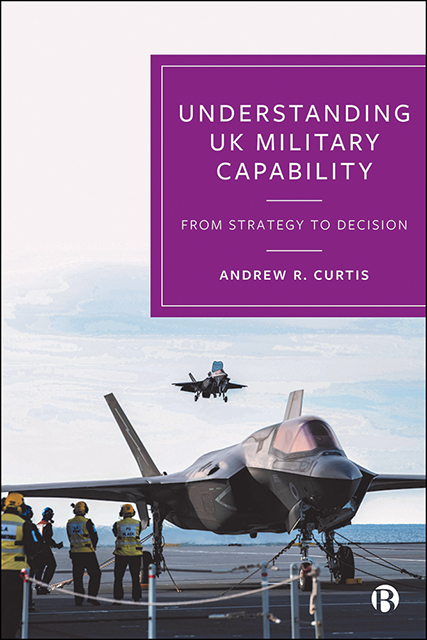Book contents
- Frontmatter
- Contents
- List of Figures and Tables
- List of Abbreviations
- Preface
- 1 Introduction
- 2 Strategic Direction and Military Capability
- 3 The UK’s Approach to Strategy
- 4 Defence Roles, Missions and Tasks
- 5 Defence Reviews
- 6 The Affordability of Defence
- 7 The MoD and the Single Services
- 8 Why Does the UK Have the Military Capability That It Has?
- Notes
- Bibliography
- Index
3 - The UK’s Approach to Strategy
Published online by Cambridge University Press: 21 June 2023
- Frontmatter
- Contents
- List of Figures and Tables
- List of Abbreviations
- Preface
- 1 Introduction
- 2 Strategic Direction and Military Capability
- 3 The UK’s Approach to Strategy
- 4 Defence Roles, Missions and Tasks
- 5 Defence Reviews
- 6 The Affordability of Defence
- 7 The MoD and the Single Services
- 8 Why Does the UK Have the Military Capability That It Has?
- Notes
- Bibliography
- Index
Summary
Hew Strachan (2005, p 48) wrote that strategy is not just a matter for historians – it concerns us all. As discussed in the previous chapter, the UK’s grand strategy during the Cold War was framed squarely around the expansionist Soviet military and nuclear threat. According to Julian Richards (2012, p 8), this impelled a strong military conception of security, whereby ‘a balance of hard power was the underpinning principle of national security’. This thinking was reflected in the language used throughout annual statements on the defence estimates of the time, and in the defence reviews of Sandys, Healey, Mason and Nott. Moreover, the concept was so obvious and uncontested that it did not require any additional amplification. This does not imply the non-existence of other pressures on national security during the Cold War. Environmental concerns like global warming were clearly an issue long before the fall of the Berlin Wall in 1989 (see, for example, Sawyer, 1972). It was simply that the perceived nature of the Soviet threat was so great that most of the security-related capability and resources were prioritized to counter it. Because of this, once the policy of deterrence had been established, it could be argued that the UK’s strategic thinking during the rest of the Cold War became moribund.
After the Cold War, the discourse around strategy at the national level, by both commentators and practitioners, increased considerably. The demise of the Soviet Union allowed the security focus to be re-directed, and other pressures could be considered and prioritized, with resources to mitigate them now accessible (Richards, 2012, pp 8– 9). Unsurprisingly, in the environment of strategic uncertainty that existed during the 1990s, academic opinion on what was now important was divided. On the one hand, it was argued that a wide range of defence capabilities should be retained to ensure the UK had sufficient flexibility to tackle a diffuse range of potential future global risks and crises (see Quinlan, 1992, p 162; and Sabin, 1993, pp 277–85). Conversely, Michael Asteris (1994, p 43) took a more focused approach, suggesting that, once the homeland security had been established, the nature of the UK’s military provision beyond that should have become much more a matter of national choice.
- Type
- Chapter
- Information
- Understanding UK Military CapabilityFrom Strategy to Decision, pp. 38 - 65Publisher: Bristol University PressPrint publication year: 2022



